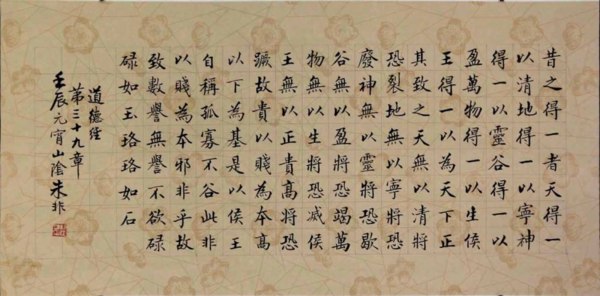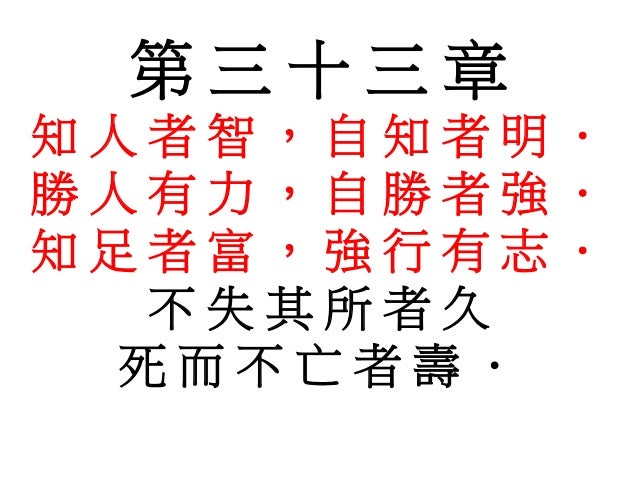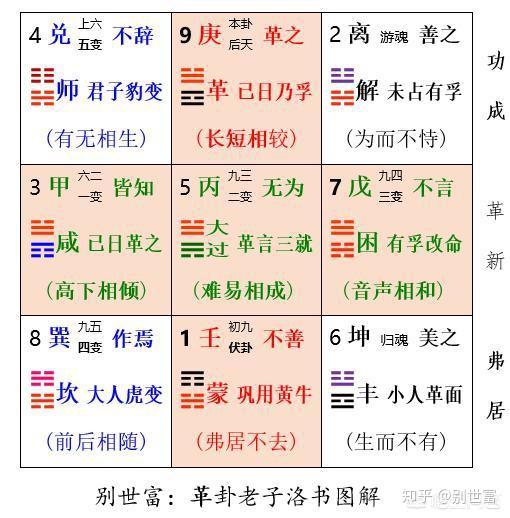
| 39 | 道德經: | 其致之,天無以清,將恐裂;地無以寧,將恐發;神無以靈,將恐歇;谷無以盈,將恐竭;萬物無以生,將恐滅;侯王無以貴高將恐蹶。 故貴以賤為本,高以下為基。 是以侯王自稱孤、寡、不穀。 此非以賤為本耶?非乎?故致數譽無譽。 不欲琭琭如玉,珞珞如石。  |
| Dao De Jing: |
(The origin of the law)
The things which from of old have got the One (the Dao) are -
Heaven which by it is bright and pure;
Earth rendered thereby firm and sure;
Spirits with powers by it supplied;
Valleys kept full throughout their void
All creatures which through it do live
Princes and kings who from it get
The model which to all they give.
All these are the results of the One (Dao).
If heaven were not thus pure, it soon would rend;
If earth were not thus sure, 'twould break and bend;
Without these powers, the spirits soon would fail;
If not so filled, the drought would parch each vale;
Without that life, creatures would pass away;
Princes and kings, without that moral sway,
However grand and high, would all decay.
Thus it is that dignity finds its (firm) root in its (previous) meanness, and what is lofty finds its stability in the lowness (from which it rises). Hence princes and kings call themselves 'Orphans,' 'Men of small virtue,' and as 'Carriages without a nave.' Is not this an acknowledgement that in their considering themselves mean they see the foundation of their dignity? So it is that in the enumeration of the different parts of a carriage we do not come on what makes it answer the ends of a carriage. They do not wish to show themselves elegant-looking as jade, but (prefer) to be coarse-looking as an (ordinary) stone.
|




《道德經》第三十九篇原文如下:昔之得一者:天得一以清,地得一以寧,神得一以靈,谷得一以盈,侯王得一以為天下式。其至也,謂,天毋以清將恐裂,地毋以寧將恐發,神毋以靈將恐歇,谷毋以盈將恐竭,侯王毋以貴以高將恐蹶。故必貴而以賤為本,必高矣而以下為基。夫是以侯王自謂孤、寡、不轂,此其賤之本與,非也?故致數與無與。是故不欲祿祿如玉,珞珞如石。

本篇的大致意思是這樣的:從前得到一(道)的情形是這樣的:天得到一就能保持清明,地得到一就能保持安寧,神得到一就能顯化靈性,溪谷得到一就能保持充盈,侯王得到一就能成為天下人的準則。當以上種種做到極致(仍不知道克制)的時候,就會出現這種情況:天如果無休止的話清下去恐怕會崩裂,地如果無休止的追求寧靜就會塌陷,神如果一味的追求顯靈就會休止,溪谷如果總是為了充盈而充盈就會枯竭,侯王無止境的高貴下去就會顛覆。所以說高貴必須要以低賤為根本,想要高就必須從地處開始打基礎。侯王之所以自稱為孤、寡、不轂,這難道不是表示不忘低賤的根本嗎?所以追求過多的聲譽反而得不到聲譽,所以有道之士不希望像精美的玉石一樣,而是願意像樸素的石頭一般。
竊以為本篇主要表達了三層觀點:得道則昌、物極必反、有無相生。
先說得道者昌。本篇中的一,其實就是道的另一個名稱。如第十篇中「載營魄抱一」,再如第二十二篇中「是以聖人抱一為天下式」及第四十二篇中:「道生一,一生二,二生三,三生萬物」, 其實都是「道」的意思。只要得道了,天就能保持晴朗,地能保持寧靜,神能得以顯靈,溪谷得以充盈,侯王則能為天下準則號令天下,所以說本篇的第一層意思就是得道者昌。
本篇的第二層意思是說物極必反,天、地、神、谷、侯王,如果刻意過度的追求清、寧、靈、盈、貴,就會過猶不及,從而陷入困境乃至潰敗消亡。這裏面也蘊含了道家順其自然,清靜無為的思想。也能和《道德經》第九篇「持而盈之,不如其已」一篇相呼應。
本篇的最後一層意思說的是有無相生的道理,這其實是一種樸素的辯證思想,貴
Dao De Jing Chapter 39 - SeddonDec 21 at 3:24 AM

39
These are the things of ancient times which obtained the One:
Heaven obtained the One and became clear;
Earth obtained the One and became stable;
The Gods obtained the One and became divine;
The Valleys obtained the One and became full;
The Ten Thousand Things obtained the One and were made alive;
Kings and lords obtained the One and ruled the empire.
Did they not all become as they are by obtaining the One?
Without clarity,
Heaven would soon shatter.
Without stability,
the Earth would soon split.
Without being divine,
the Gods would soon dissolve.
Without being full,
the Valleys would soon be exhausted.
Without life,
the Ten Thousand Things would soon
perish.
Without kings and lords,
the empire would soon fall.
Therefore the noble has its root in the humble.
The high has its foundation in the low.
This is why kings and lords call themselves
orphaned, lonely, and without sustenance.
Thus they regard the humble as their root.
Those who are most praiseworthy
Do not need praise.
They prefer neither to be rare, like jade,
Nor common, like a stone.

「昔之得一者: 天得一以清,地得一以寧,神得一以靈,谷得一以盈,物得一以生,侯王得一以為天下正。其致之也,謂天無以清將恐裂,地無以寧將恐廢,神無以靈將恐歇,谷無以盈將恐竭,萬物無以生將恐滅,侯王無以貴高將恐蹶。故貴以賤為本,高以下為基,是以侯王自謂孤寡不穀,此非以賤為本邪?非乎!故致數譽無譽,不欲琭琭如玉,珞珞如石。」
譯文:
溯其源頭,古早以前能得大道整體之全的:「天」得此整體之道,因之而清明,「地」得此整體之道,因之而寧靜,「神」得此整體之道,因之而靈感,「谷」得此整體之道,因之而盈滿,萬物」得此整體之道,因之而生長,「侯王」得此整體之道,因而能以正道治國。就此往前推論來說,天若不清明,將恐分裂;地若不寧靜,將恐崩廢,神若不靈通,將恐消歇,谷若不盈滿,將恐枯竭,萬物不得生長,將恐絕滅,侯王不得高貴正位,將恐頹蹶。如此說來,「貴以賤為根本」、「高以下為基礎」,因而侯王自稱為「孤」、「寡」、「不穀」,這豈不是以賤為本嗎?不是嗎!由此看來,最高的榮譽,那是無譽之譽;修道之人,不願別人稱譽它琭琭如玉,而寧可無譽的珞珞如石一般!
自古以來做到「吾道一以貫之」的有以下這些:天得天道而能清;地得地道而能寧;神得神道而能靈;谷得谷道而能盈;萬物各得其道而生;君王得王道使天下得治。怎麼知道他們得道了呢?天若不清恐怕會裂開。地若不寧恐怕會爆發。神若不靈恐怕廟要歇業。谷若不盈恐怕就乾涸了。萬物無以為生就要滅亡。君王沒有釋權給下位者,恐怕沒人幫忙抬轎,就要蹶了。所以,高貴要以賤下做為基礎才能穩固。因此君王才都自稱“孤、寡、不善”,這難道不是以賤為本的道理嗎?不是嗎?所以擁有很多車就和沒車一樣,因為一個人沒辦法同時開數輛車,一定要找司機幫忙才能開。所以,做人不可貴己如玉而賤人如石。
藥方:
「一」是一切的本源,也是當下的起點,想著「一」,一件一件的去做完它,不必掛心!你高貴嗎?正因為有所謂的「低賤」襯托出來的,想到這裡,你怎能不對所謂的「低賤」默首道謝呢?最高的榮譽不必須索、貪求,寧可無什榮譽,因為自然大道本來是平平常常,那有什麼榮譽!你不夠好,人家說你好,這要慚愧!你很好,人家說你不好,卻要坦然!
研討:
吾道一以貫之
論語‧衛靈公篇:
子曰:「賜也,女以予為多學而識之者與?」
對曰:「然,非與?」
子曰:「非也,予一以貫之!」
論語‧里仁篇:
子曰:「參乎!吾道一以貫之。」
曾子曰:「唯。」
子出,門人問:「何謂也?」
曾子曰:「夫子之道,忠恕而已。」
翻譯:
論語‧衛靈公篇中提到:
孔子說:「子貢啊!你認為老師的學問是靠博學強記而得來的嗎?」
回答說:「是啊!難道不是嗎?」
孔子說:「不是的,我是將所學一一融會貫通而歸納成一個中心思想!」
論語‧里仁篇補充說:
孔子說:「曾子啊!我所說的道其實只有一個中心思想。」
曾子回答:「是啊!」
孔子離去後,其他弟子問說:「孔子的中心思想是什麼呢?」
曾子回答:「孔子的中心思想,用”忠恕”二字就都涵蓋了。」
朱熹《論語集注》說:「盡己之謂忠,推己之謂恕。」
盡己就是要使自己的生理需求、安全需求、社交需求、尊重需求、自我實現需求以及超自我實現需求得到適切的滿足。再進一步推己及人,使天下人的生理需求、安全需求、社交需求、尊重需求、自我實現需求以及超自我實現需求都得到適切的滿足。這樣就能做到「忠恕」,也就是達到「道」的境界。
* 首頁
No comments:
Post a Comment